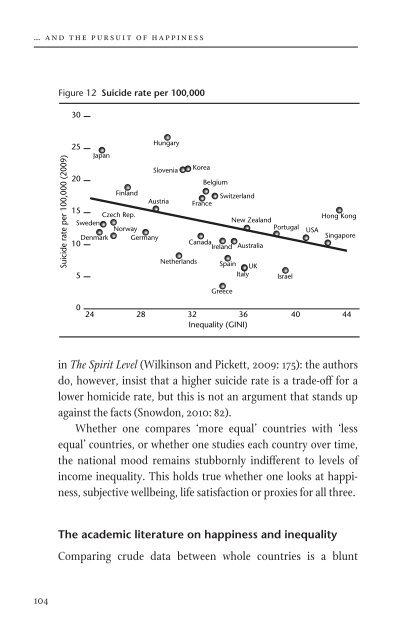… and the Pursuit of Happiness - Institute of Economic Affairs
… and the Pursuit of Happiness - Institute of Economic Affairs
… and the Pursuit of Happiness - Institute of Economic Affairs
Create successful ePaper yourself
Turn your PDF publications into a flip-book with our unique Google optimized e-Paper software.
<strong>…</strong> <strong>and</strong> <strong>the</strong> pursuit <strong>of</strong> happiness<br />
are more equal countries happier?<br />
Figure 12 Suicide rate per 100,000 1<br />
2<br />
30<br />
3<br />
Hungary<br />
4<br />
25<br />
Japan<br />
5<br />
Slovenia<br />
Korea<br />
6<br />
20<br />
Belgium<br />
7<br />
Finl<strong>and</strong><br />
Switzerl<strong>and</strong><br />
Austria France<br />
8<br />
15<br />
Czech Rep.<br />
Hong Kong<br />
Sweden<br />
New Zeal<strong>and</strong><br />
9<br />
Norway<br />
Portugal<br />
USA<br />
Denmark Germany<br />
Singapore<br />
10<br />
10<br />
Canada<br />
Irel<strong>and</strong> Australia<br />
11<br />
Ne<strong>the</strong>rl<strong>and</strong>s Spain UK<br />
12<br />
5<br />
Italy Israel<br />
13<br />
Greece<br />
14<br />
0<br />
24 28 32 36 40 44<br />
15<br />
Inequality (GINI)<br />
16<br />
17<br />
18<br />
19<br />
20<br />
21<br />
22<br />
23<br />
24<br />
25<br />
26<br />
Source: Statistics from <strong>Institute</strong> for Fiscal Studies (2010)<br />
27<br />
28<br />
The academic literature on happiness <strong>and</strong> inequality<br />
29<br />
30<br />
Suicide rate per 100,000 (2009)<br />
in The Spirit Level (Wilkinson <strong>and</strong> Pickett, 2009: 175): <strong>the</strong> authors<br />
do, however, insist that a higher suicide rate is a trade-<strong>of</strong>f for a<br />
lower homicide rate, but this is not an argument that st<strong>and</strong>s up<br />
against <strong>the</strong> facts (Snowdon, 2010: 82).<br />
Whe<strong>the</strong>r one compares ‘more equal’ countries with ‘less<br />
equal’ countries, or whe<strong>the</strong>r one studies each country over time,<br />
<strong>the</strong> national mood remains stubbornly indifferent to levels <strong>of</strong><br />
income inequality. This holds true whe<strong>the</strong>r one looks at happiness,<br />
subjective wellbeing, life satisfaction or proxies for all three.<br />
Comparing crude data between whole countries is a blunt<br />
instrument, but more sophisticated attempts to test whe<strong>the</strong>r<br />
inequality affects happiness have not produced compelling<br />
evidence. Perhaps <strong>the</strong> most thought-provoking <strong>of</strong> <strong>the</strong>se was <strong>the</strong><br />
study by Alesina et al. (2004), which found that happiness was<br />
sometimes affected by inequality, but was principally dependent<br />
on social attitudes ra<strong>the</strong>r than inequality per se, a conclusion<br />
echoed by Biancotti <strong>and</strong> D’Alessio (2008), Hopkins (2008) <strong>and</strong><br />
Bjørnskov et al. (2010). While it might be expected that <strong>the</strong> rich<br />
would be less troubled by inequality than <strong>the</strong> poor, this was not<br />
necessarily <strong>the</strong> case. Alesina et al. found low-income Europeans to<br />
be averse to inequality, while low-income Americans were ‘totally<br />
unaffected’. Rich Americans were <strong>of</strong>ten more averse to inequality<br />
than <strong>the</strong>ir poorer compatriots, while left-wingers were more sensitive<br />
to changes in wealth distribution on both sides <strong>of</strong> <strong>the</strong> Atlantic.<br />
Alesina et al. explained <strong>the</strong> paradox <strong>of</strong> American tolerance<br />
to inequality, despite a wealth gap that dwarfs most European<br />
countries, by reference to <strong>the</strong> prevailing belief that wealth is <strong>the</strong><br />
product <strong>of</strong> hard work <strong>and</strong> merit – a view that is widely shared in<br />
Europe only by <strong>the</strong> rich. In contrast to Europeans, Americans are<br />
inclined to view inequality as justified <strong>and</strong> wealth redistribution<br />
as unfair. Americans have greater faith in social mobility, with <strong>the</strong><br />
poor expecting to move up <strong>the</strong> ladder <strong>and</strong> <strong>the</strong> rich fearing <strong>the</strong>y<br />
might move down. Alesina et al. found that 60 per cent <strong>of</strong> Europeans<br />
believed <strong>the</strong> poor were trapped in poverty, while only 30<br />
per cent <strong>of</strong> Americans felt <strong>the</strong> same way. When asked whe<strong>the</strong>r <strong>the</strong><br />
poor were lazy, <strong>the</strong> percentages were exactly reversed.<br />
Regardless <strong>of</strong> whe<strong>the</strong>r <strong>the</strong>se beliefs are grounded in reality,<br />
<strong>the</strong> study showed that perceptions <strong>of</strong> fairness <strong>and</strong> social mobility<br />
are more important than inequality itself. Some people are made<br />
less happy by inequality while o<strong>the</strong>rs ra<strong>the</strong>r like it. A greater<br />
104 105












